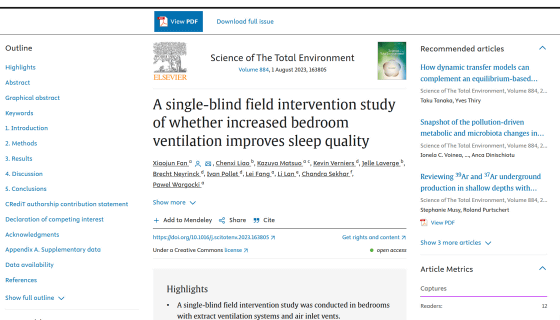A 4-week experiment found that ``ventilation of the bedroom'' improves sleep quality

Getting quality sleep is very important for mental and physical health, and many people spend money on bedding and sleep environments to enrich their lives. A new experiment conducted by an international research team such as the Technical University of Denmark and Waseda University has shown that ``ventilating the bedroom while sleeping'' improves the quality of sleep.
A single-blind field intervention study of whether increased bedroom ventilation improves sleep quality - ScienceDirect

Enhanced bedroom ventilation linked to improved sleep quality
https://www.psypost.org/2023/11/enhanced-bedroom-ventilation-linked-to-improved-sleep-quality-214305
Four-Week Experiment Reveals an Ingeniously Simple Way to Boost Your Sleep Quality : ScienceAlert
https://www.sciencealert.com/experiment-reveals-a-simple-way-to-boost-your-sleep-quality
Lead author Xiaojun Huang , a postdoctoral researcher at ETH Zurich and at the Technical University of Denmark at the time of the study, said, ``Sleep is extremely important for our health, well-being, and productivity.'' ``The bedroom is a private space. This is where we sleep and spend about one-third of our lives.It has already been researched and verified that lack of ventilation in the bedroom has a negative impact on sleep quality, but that was only in a laboratory. There was a lack of evidence to support this finding in a real-world setting controlling for other factors.'
To investigate the relationship between bedroom ventilation and sleep quality, Huang and his team invited 29 users of products from Belgian ventilation system manufacturer Renson Ventilation NV to participate in an experiment over a four-week period. The we. The participants were between 27 and 65 years old, did not have any major sleep disorders, and did not regularly use sleeping pills. In addition, all subjects lived in Belgium, and their bedrooms had central ventilation systems that allowed them to adjust the ventilation rate from outside without the residents' knowledge.

First, the research team had subjects sleep as usual for one week and measured their sleep quality using a sleep tracker worn on their wrist. Natural bedroom conditions were also measured, including normal ventilation rates and air quality. Next, the subjects slept at different ventilation rates (low, medium, and high) every week, and their sleep quality and bedroom environment were similarly measured.
As a result of a total of four weeks of experiments, it was found that ventilation rate affected the concentration of carbon dioxide and
Relative humidity also decreased slightly with increasing ventilation rate, but its levels remained in the range of 50–60%, which is optimal for sleep, and temperature did not change significantly with ventilation rate. This means that even when the ventilation rate was increased, the subjects did not feel discomfort due to temperature fluctuations.
Importantly, sleep quality, which consists of objective measurements such as sleep duration, sleep efficiency, percentage of deep sleep, percentage of light sleep, and frequency of mid-morning awakenings, improves with increasing ventilation rate. got it. In particular, increasing the ventilation rate from 'low' to 'medium' reduced the number of mid-day awakenings, increased deep sleep, and decreased light sleep.
Mr. Huang told psychology media PsyPost, ``An important finding for the general public is that improving the ventilation of the bedroom leads to improved sleep quality.Currently, the ventilation of the bedroom is not good. If so, we should take action to improve it.'

◆Forum now open
A forum related to this article has been set up on the GIGAZINE official Discord server . Anyone can write freely, so please feel free to comment! If you do not have a Discord account, please create one by referring to the article explaining how to create an account!
• Discord | 'Do you ventilate when you sleep?' | GIGAZINE
https://discord.com/channels/1037961069903216680/1174276523214258176
Related Posts:
in Science, Posted by log1h_ik






